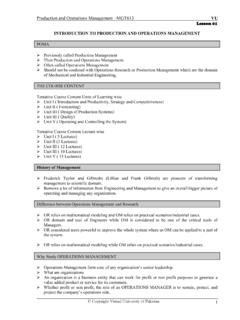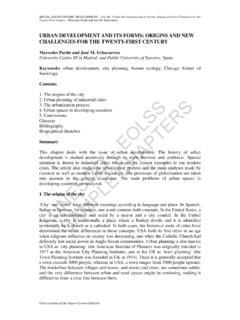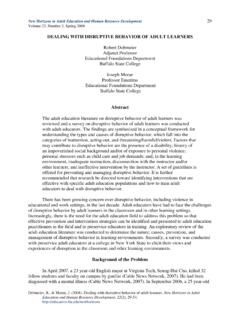Transcription of Introduction to Sociology - SOC101 final
1 Introduction to Sociology SOC101 VU Copyright Virtual University of Pakistan Introduction to Sociology SOC101 Table of Contents Page no. Lesson 1 The Origins of 1 Lesson 2 Sociological 4 Lesson 3 Theoretical 7 Lesson 4 Sociology as 10 Lesson 5 Steps in Sociological 12 Lesson 6 Social 14 Lesson 7 Social 17 Lesson 8 Formal 20 Lesson 9 23 Lesson 10 Culture (continued).. 25 Lesson 11 Culture (continued).. 27 Lesson 12 Socialization: Human 30 Lesson 13 Understanding the Socialization 33 Lesson 14 Agents of 36 Lesson 15 Socialization and the Life Course .. 38 Lesson 16 Social Control and Deviance .. 41 Lesson 17 The Social Foundations of 43 Lesson 18 Explanations of 45 Lesson 19 Explanations of Crime (continued).. 47 Lesson 20 Social Distribution of Crime: 51 Lesson 21 Social Stratification: Introduction and 55 Lesson 22 Theories of Class and 57 Lesson 23 Theories of Class and 59 Lesson 24 Theories of Class and 61 Lesson 25 Social Class As 62 Lesson 26 Social.
2 64 Lesson 27 The Family: Global Variety .. 67 Lesson 28 Functions of .. 69 Lesson 29 Family and Marriage in 71 Lesson 30 Gender: A Social 74 Lesson 31 Gender 76 Lesson 32 Explanations of Gender 79 Lesson 33 Functions of 82 Lesson 34 Issues in 84 Lesson 35 Population Study and its 86 Lesson 36 Theory of Population 89 Lesson 37 Population Profile of 92 Lesson 38 Population Profile of Pakistan (continued).. 96 Lesson 39 Implication of Population 102 Lesson 40 Population 109 Lesson 41 Environment and 112 Lesson 42 Environmental 114 Lesson 43 Social 117 Lesson 44 Causes of Social 119 Lesson 45 Modernity and Post 122 Introduction to Sociology SOC101 VU Copyright Virtual University of Pakistan 1 Lesson 1 THE ORIGINS OF Sociology Lesson Overview: Auguste Comte Herbert Spenser Karl Marx Emile Durkheim Max Weber The Fields of Sociology Sociology is the scientific study of human social life, groups and societies.
3 There was no Sociology as a distinct discipline before the advent of 19th century. As a distinct discipline it emerged about the middle of the 19th century when European social observers began to use scientific methods to test their ideas. It looks that three factors led to the development of Sociology . The first was the Industrial revolution. By the mid 19th century Europe was changing from agriculture to factory production. There was the emergence of new occupations as well as new avenues of employment away from the land. Masses of people migrated to cities in search of jobs. Pull and push factors were instrumental in such migrations. In the countryside, due to the nature of agricultural society, there were no occupations that could be alternatives to agriculture.
4 Hence people got pushed to look for new places whereas the urban/industrial places with new job opportunities provided a pull to the same population. At the new places there was anonymity, crowding, filth, and poverty. Ties to the land, to the generations that had lived there before them, and to the ways of their life were abruptly broken. Eventually the urban life brought radical changes in the lives of people. The city greeted them with horrible working conditions: low pay; long and exhausting working hours; dangerous work; foul smoke; and much noise. To survive the vagaries of life, families had to permit their children to work in these uncongenial conditions. People in these industrial cities developed new ideas about democracy and political rights.
5 They did not want to remain tied to their rulers. Therefore the ideas about individual liberty, individual rights to life, liberty, and pursuit of happiness emerged, which actually laid the foundation to future political revolution. The second factor that stimulated the development of Sociology was imperialism. Europeans successfully conquered many parts of the world. They were exposed to radically different cultures. Startled by these contrasting ways of life, they began to ask why cultures differed. The third impetus for the development of Sociology was the success of the natural sciences. People moved to question fundamental aspects of their social world. They started using the scientific method (systematic observation, objectivity) to the study of human behaviour.
6 Auguste Comte The idea of applying the scientific method to the social world, known as positivism, was apparently first proposed by Auguste Comte (1798-1857). He was French. He migrated from a small town to Paris. The changes he himself experienced, combined with those France underwent in the revolution, led Comte to become interested in the two interrelated issues: social order (social static) and social change (social dynamics). What holds the society together (Why is there a social order)? And once the society is set then what causes it to change? Why its directions change? Comte concluded that the right way to answer such questions was to apply the scientific method to social life. There must be laws that underlie the society. Therefore we should discover these principles by applying Introduction to Sociology SOC101 VU Copyright Virtual University of Pakistan 2 scientific method to social world.
7 Once these principles discovered then we could apply these for social reform. He advocated for building new societies on twin foundations of science and industry rather than on religion and landowner-serf relationship. This will be a new science and Comte named it as Sociology (1838) the study of society. Comte is credited with being the founder of Sociology . Other early pioneer names are: Herbert Spenser (1820-1903) He was an Englishman and is sometimes called second founder of Sociology . He too believed that society operates under some fixed laws. He was evolutionary and considered that societies evolve from lower to higher forms. In this way he applied the ideas of Darwin to the development of human society, and hence this approach may be called as Social Darwinism.
8 By following the basic principle of Social Darwinism Spenser advocated that let the fittest survive . There should be no reform because it will help in the survival of lower order individuals. (Charity and helping the poor were considered to be wrong). Spenser was a social philosopher rather than a social researcher. Karl Marx (1818-1883) Karl Marx was a German. According to him the key to human history is Class Conflict. Not really a sociologist but wrote widely about history, philosophy, economics, political science. Because of his insights into the relationship between the social classes, he is claimed to be an early sociologist. He introduced one of the major perspectives in Sociology conflict perspective. Emile Durkheim (1858-1917) He was French. His primary goal was of getting Sociology recognized as a separate academic discipline.
9 His systematic study comparing suicide rates among several countries revealed an underlying social factor: People were more likely to commit suicide if their ties to others in their communities were weak. He identified the key role of social integration in social life. Max Weber (1864-1920) Max Weber was a German. He used cross-cultural and historical materials in order to determine how extensively social groups affect people s orientations to life. The Fields of Sociology There is a big diversity in fields of interest in Sociology . There is long list of fields that have been provided by the American Sociological Association as a Guide to Graduate Departments which is given below: Biosociology Occupations/Professions Collective Behaviour/Socioal Movements Penology/Corrections Community Political Sociology Comparative Sociology /Macro Sociology Race/Ethnic/Minority Relations Criminal Justice Religion Criminology/Delinquency Rural Sociology Cultural
10 Sociology Small Groups Demography Social Change development /Modernization Social Control Deviant Behaviour/Social Disorganization Social Networks Economy and Society Social Organizations/formal/complex Education Social Psychology Environmental Sociology Socialization Ethno methodology Sociological Practice/Social Policy History of Sociology / Social Thought Sociology of Aging/Social Gerontology Human Ecology Sociology of Art/Literature Industrial Sociology Sociology of Knowledge Introduction to Sociology SOC101 VU Copyright Virtual University of Pakistan 3 International development /Third World Sociology of Language/Social Linguistics Law and Society

















